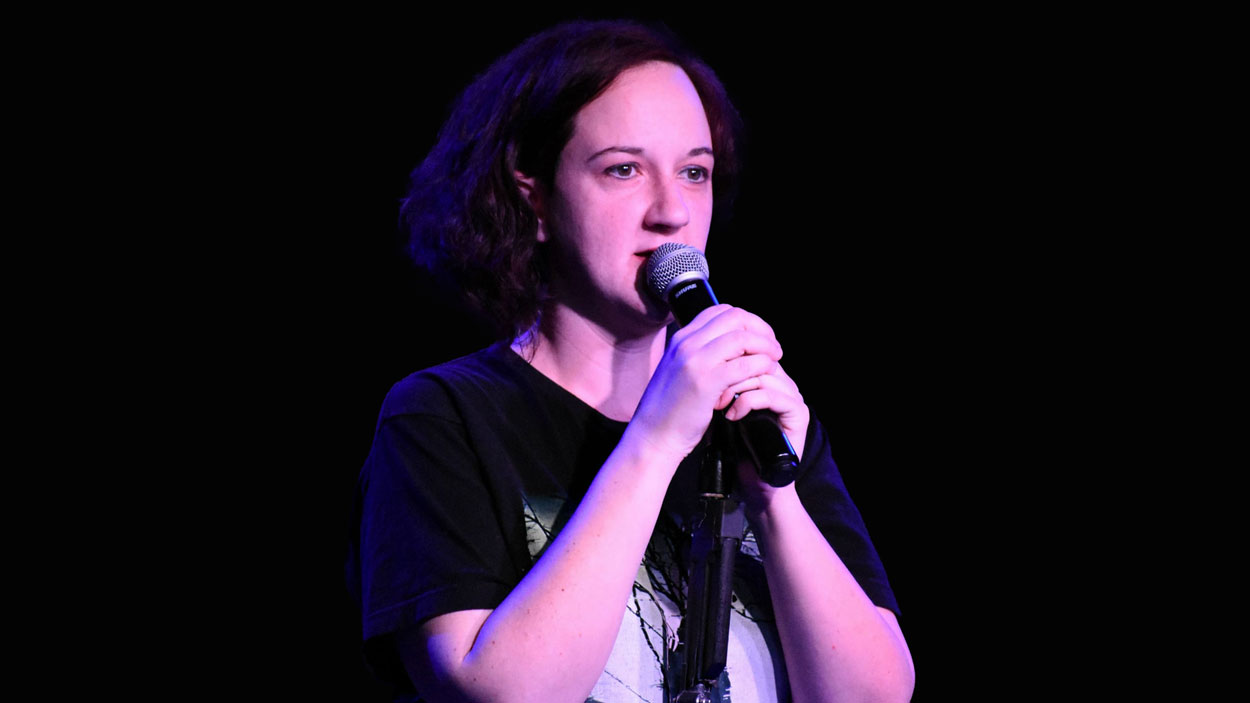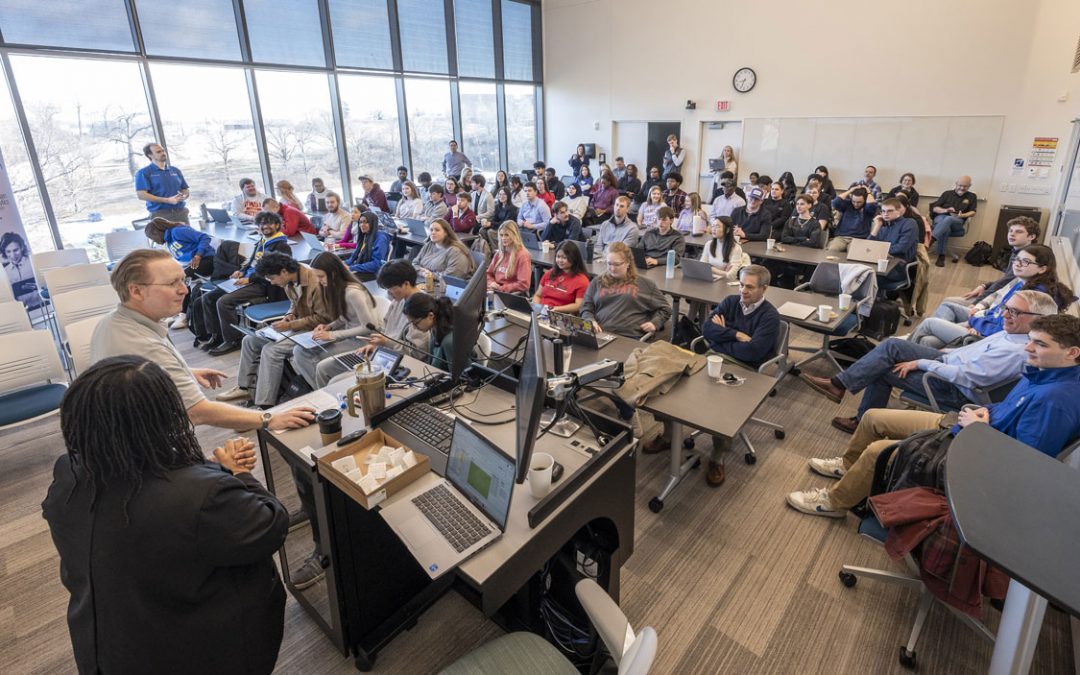
Serenity Dougherty has performed stand-up comedy for more than 15 years, primarily at Duffy’s Comedy Workshop in Lincoln, Nebraska. Dougherty, an UMSL MFA graduate, is now tapping into her experience as a comedian for her PhD research at the University of Nebraska–Lincoln. (photo courtesy of Serenity Dougherty/photo composite by Burk Krohe)
After 15 years of comedy shows, Serenity Dougherty knows she can step on stage and wrestle a laugh out of even the toughest audience. By now, Dougherty’s stand-up act is almost equal parts art and science.
She carefully takes the temperature of the room, pushing or pulling back, adjusting the pace of her set based on the crowd’s reactions. Whether it’s new material or a five-year-old joke that she’s repeated hundreds of times, she’ll make it work most nights.
“It’s not just about writing your stuff,” Dougherty said. “It’s also about writing your stuff and being emotionally attuned to how the audience is responding to it, figuring out how to tweak things. They were really mad at this part, so I need to dial it back here a little bit so that I can get to this part here without them being outraged, right? I need them to pay attention long enough to get to the relief of the tension.”
Dougherty, a graduate of the MFA program at the University of Missouri–St. Louis, is currently exploring the relationship between stand-up comedy and the audience in her PhD dissertation at the University of Nebraska–Lincoln.
Despite the popularity of the medium, there is little existing scholarship on stand-up comedy. Dougherty added that there is also a lack of research on the audience in the field of rhetoric and composition – the focus of her doctoral program at UNL. Dougherty is using the relationship between stand-up comedians and the audience as a lens for better understanding the writing process, particularly feedback and revisions.
“Comedy is a form of writing that encounters its audience more directly – embodied right in front of you over and over and over again,” she explained. “I get to see the moment that my text hits my audience, whereas when I’m writing fiction, I write it and then I send it off. Maybe I get feedback later, but I don’t see the moment when people are hearing it or reading it. Comedy is designed to hit its audience directly.”
Since the 1980s, a predominant view in academia has been that scholars and writers should ignore thinking about the audience because it can potentially cause writer’s block. This view was epitomized in “Closing My Eyes as a I Speak: An Argument for Ignoring Audience,” a paper by the late Peter Elbow, a well-known English professor at the University of Massachusetts Amherst.
However, that’s impossible with stand-up comedy. Comedians face immediate feedback in the wild – something they’re aware of each time they step on stage – and often revise their material on the fly or over the course of consecutive shows.
“As a comedian, [revisions] are not based on, ‘Oh, what if I move this part here and this part here?’” Dougherty said. “No, that’s not how the audience responds to what they’re reading from me. They respond based on how they’re feeling. That’s how feedback happens outside of academic institutions. A lot of times, it’s just, ‘this isn’t workable.’ You need to revisit this, and then you have to figure out what they might be responding to, but we don’t practice those skills in school.”
To conduct her research, Dougherty is relying on the connections she’s made performing and hosting the open mic night at Duffy’s Comedy Workshop in Lincoln, Nebraska, for more than a decade. She’s conducting two rounds of structured interviews with local comics, recording observations via field notes and conducting a literature review.
The little existing scholarship there is on comedy has primarily focused on analyzing the recorded TV specials of famous performers, so Dougherty is happy to shine a light on local comedy scenes with her dissertation.
“There are a million comedians across this country, easily,” she said. “They’re all over the place. We only see a small handful of them on Netflix or places like that. If we’re only looking at prerecorded specials, we are looking at the outliers within the scene.”
While comedy is now a fundamental aspect of Dougherty’s identity, she came to it later in life. Dougherty was always a creative child growing up in O’Neill, Nebraska. She read everything she could get her hands on, and she was such a frequent visitor to the local library that the librarians would give her special preference on checking out popular books.
However, she didn’t have much exposure to comedy apart from a single Jeff Foxworthy cassette tape her parents owned. In high school, her then-boyfriend (and now husband), Will, brought her a stack of VHS tapes full of recorded Comedy Central specials. These served as her initial crash course in comedy.
Dougherty stepped on stage for the first time as an undergraduate student at UNL. At the time, she was taking an immersive journalism course, “Writing in Communities,” where students had to go from observer to participant in a community. She was already familiar with Duffy’s Comedy Workshop thanks to her boyfriend, who was regularly performing there, and the class provided the push she needed to grab the mic herself.
She performed regularly at Duffy’s while completing her bachelor’s degree in English, and after graduation, she began applying to MFA programs throughout the Midwest. Unfortunately, those applications were met with rejection, but Northern Michigan University admitted her to the university’s creative writing MA program.
Undeterred, Dougherty remained focused on her goal of enrolling in an MFA program upon graduating from NMU. After polishing her writing samples, she was accepted to three programs but chose UMSL due to the program’s flexibility.
“Part of what drew me to UMSL was the fact that they were willing to let me work on a novel,” she said. “The other programs, when I talked about workshopping novel chapters, they were like, ‘We don’t really do that unless a chapter could stand alone as a short story.’”
But Associate Professor Suellynn Duffey and Associate Professor Lauren Obermark had no qualms about working with Dougherty on her novel about stand-up comedy. The pair served as mentors, and overall, the experience in the Department of English was formative for Doughtery.
“UMSL was a massive chapter in my development as a person,” she said. “It was just everything. The fact that it’s the school I got to teach at for the first time on a campus that had such a unique student population. I had students in my class who lived on campus, who were in the traditional 18- to 22-year-old bracket. But then I’d also have a 65-year-old veteran.”
In St. Louis, Dougherty continued to perform stand-up at venues like the Heavy Anchor in south St. Louis, but she also found passions for academia and teaching. She credits Duffey and Obermark for encouraging her interests and writing the recommendation letters that helped secure her position in the doctoral program at UNL.
“I loved the teaching I was doing, and then I was working with the creative writing faculty on my novel about stand-up comedy,” she said. “I was thinking about stand-up comedy more and more, and all of that blended into this thing where it was like, ‘You know what? Comedy can be academic. I should be researching this more.’”
Now, Dougherty is pursuing that ambition and introducing students to the artform through her undergraduate composition course centered around developing a stand-up act. It’s one of the best gigs she’s ever booked, and UMSL helped make it happen.
“I love the English Department at UMSL,” she said. “They are all amazing. If I could send everybody there for a little refresher course in life, I totally would. They’re just the best. They go above and beyond for their students, they really do.”














